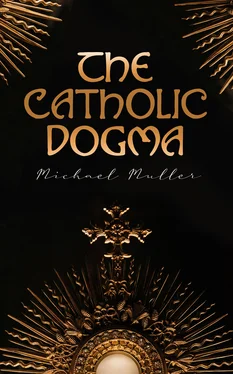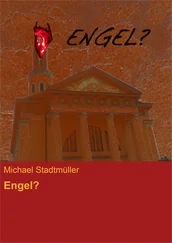"Nothing will set this in a clearer light than a few examples. Conscience tells a heathen that it is not only lawful, but a duty, to worship and offer sacrifice to idols, the work of men's hands. Will his doing so, according to his conscience, save him? or will these sets of idolatry be innocent or agreeable in the sight of God, because they are performed according to conscience? ' The idol that is made by hands is cursed, as well as he that made it; … for that which is made, together with him that made it, shall suffer torments.' (Wis. xiv. 8, 10.) Also, ‘He that sacrificeth to gods shall be put to death, save only to the Lord.' (Exod. xxii. 20.) In like manner, a Jew's conscience tells him that he may lawfully and meritoriously blaspheme Jesus Christ, and approve the conduct of his forefathers in putting him to death upon a tree. Will such blasphemy save him, because it is according to the dictates of his conscience? The Holy Ghost, by the mouth of St. Paul, says, 'If any man love not our Lord Jesus Christ, let him be anathema,' that is, 'accursed.’ (I. Cor. xvi. 22.) A Mahometan is taught by his conscience that it would be a crime to believe in Jesus Christ, and not believe in Mahomet; will this impious conscience save him? The Scripture assures us that 'there is no other name given to men under heaven by which we can be saved,' but the name of Jesus only; and ‘he that believeth not the Son shall not see life, but the wrath of God remaineth on him.’ All the various sects which have been separated from the true Church, in every age, have uniformly calumniated and slandered her, speaking evil of the truth professed by her, believing in their conscience that this was not only lawful, but highly meritorious. Will calumnies and slanders against the Church of Jesus Christ save them because of their approving conscience? The Word of God declares, ‘That the nation and the kingdom that will not serve her shall perish;' and ‘there shall be lying teachers who shall bring in damnable heresies, bringing upon themselves swift destruction, … through whom the way of truth shall be evil spoken of.' (II. Pet. ii. 1.) In all these, and similar cases, their conscience is their greatest crime, and shows to what a height of impiety conscience and reason can lead us, when under the influence of pride, passion, prejudice, and self-love. Conscience and reason, therefore, can never be safe guides to salvation, unless directed by the sacred light of revealed truth."
"An effect," says St. Thomas, "is never greater than its cause, nor any act more efficacious than the active power which produces it, wherefore the enjoyment of eternal beatitude is not within the power of our natural faculties. So, man, left to his own powers, can only produce acts conformable to his nature and existence, such as to acquire art and science, to labor in any employment, and to enjoy private and social happiness, but he can never come to God and possess him without supernatural assistance. It is useless to adjust the strings of a harp or lyre; they remain silent until they are put in motion by the hand of a musician. A vessel is rigged out with its masts, cables, and sails, and ready for sailing, but wants a fair breeze to launch it into the deep. In like manner, people, to be saved, want the powerful hand of God to direct their course to another world, to assist and to enlighten them in their pilgrimage. Hence it is evident that the first step towards God and salvation is supernatural knowledge of God and divine faith in the four great truths of salvation as a necessary preparatory means to obtain the grace of justification; that neither invincible ignorance of the necessary truths of salvation, nor the mere knowledge of these truths can be means to convey sanctifying grace to the soul: To the knowledge of those truths must be joined supernatural divine faith in them, confident hope in the Redeemer, and perfect charity, which includes perfect sorrow for sin and the implicit desire to comply with God's will in all that he requires of the soul, to be saved.
These dispositions of the soul are the effects of the grace of God, and not of anything else whatsoever; and the infusion of sanctifying grace into the soul that is thus prepared is the gratuitous gift granted by the infinite mercy of God on account of the merits of the Redeemer.
St. Thomas asks the question: Did Jesus Christ, when he descended into Limbo, deliver the souls of children who died in original sin? To understand this, we must remember a certain principle and doctrine, namely: There is no salvation possible for any one without being united to Jesus Christ crucified. Hence the great Apostle St. Paul says: "It is Jesus Christ whom God hath proposed to be a propitiation through faith in his blood." (Rom. iii. 25.) Now, those children were not united to Christ by their own faith because they had not the use of reason, which is the foundation of faith; nor were they united to Christ by the faith of their parents, because the faith of their parents was not sufficient for the salvation of their children; nor were those children united to Christ by means of a sacrament, because there was no sacrament under the Old Law which had of itself the virtue of conferring either grace or justification.
Besides, life eternal is granted only to those who are in the state of sanctifying grace. "The grace of God is life everlasting in Jesus Christ our Lord." (Rom, vi. 23.) All those, therefore, who died at any age without perfect charity and faith in the Redeemer to come, as well as those who die without the sacrament of spiritual generation after the Passion and Death of Jesus Christ, are not purified from the mortal stain of original sin, and are, consequently, excluded from the kingdom of eternal glory. (De Incarn., Q. lii., art. vii.)
All this is also certain from what the Council of Trent has defined (Sess. 6. can. 3.) namely, that, without supernatural knowledge and faith, it is impossible to fulfil the Law of God, to be justified and become acceptable to him. (See Cornel. a Lap., Comment. in Ep. ad Rom., c. ii.)
Hence the foot-note, found on page 230 in Catholic Belief is not correct, namely: "A believer in one God who, without any fault on his part, does not know and believe that in God there are three divine Persons, is, notwithstanding, in a state of salvation, according to the opinion of most Catholic theologians."
No good theologian ever made such an assertion. All good theologians attribute justification neither to inculpable ignorance of, nor even to the knowledge of, the necessary truths of salvation; they attribute it to the infinite mercy of God, who unites himself with the soul only when it is prepared by the supernatural acts of divine faith, hope, and charity.
Therefore, only a theologian like "Sir Oracle" might easily endorse the above assertion.
"The three theological virtues," says St. Thomas, "incline and prepare man for supernatural happiness. Reason receives supernatural lights by faith; which gives us a foresight of eternal glory; the will tends by hope towards it as possible and attainable; and charity unites us to God, the eternal source of all joy and happiness."
"It is impossible" says O. A. Brownson, "to make Catholics and non-Catholics understand this great truth and conceive a correct idea of the spirit and essence of religion, unless it is clearly shown that our religion is based on divine revelation, and placed in the guardianship of a body of men divinely commissioned to teach the world, authoritatively and infallibly, all its sacred and immutable truths,--truths which all men are consequently bound in conscience to receive without hesitation. This is the fixed standard of Catholic belief; it is the basis upon which all dogmas rest. If this all-important truth be well understood by Catholics, the snares to entrap them may be very cunningly laid yet they will not be easily caught in the meshes."
Читать дальше












